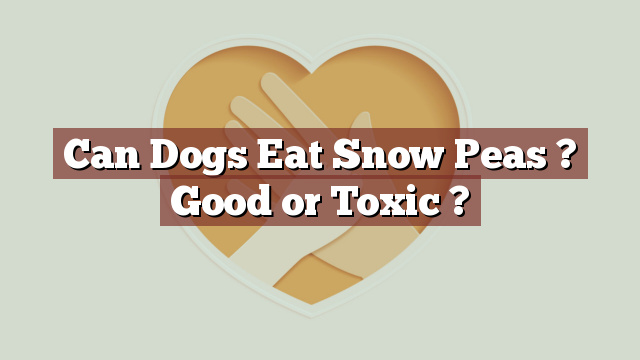Can Dogs Eat Snow Peas? Good or Toxic?
As pet owners, it is important for us to be aware of what foods are safe for our furry friends. While some human foods can be harmful or even toxic to dogs, others can provide nutritional benefits. Today, we will be discussing snow peas and whether or not they are safe for dogs to consume.
Nutritional Value of Snow Peas: Vitamins, Minerals, and Fiber
Snow peas are a type of legume that are rich in vitamins, minerals, and fiber. They are low in calories and contain essential nutrients such as vitamin C, vitamin K, vitamin A, iron, and potassium. Additionally, snow peas are a great source of dietary fiber, which can aid in digestion and promote a healthy gut.
Can Dogs Eat Snow Peas? Safety and Toxicity Considerations
Yes, dogs can eat snow peas. Snow peas are generally safe for dogs to consume and can even provide some health benefits. However, it is important to keep in mind a few factors before feeding snow peas to your furry friend.
While snow peas themselves are not toxic to dogs, it is crucial to avoid giving them any snow peas that have been seasoned with ingredients that may be harmful to dogs, such as garlic, onions, or excessive salt. These additions can be toxic and cause various health issues in dogs.
Potential Risks and Benefits of Snow Peas for Dogs
When given in moderation and prepared without any harmful additives, snow peas can offer several benefits to dogs. The high fiber content in snow peas can aid in maintaining a healthy digestive system and prevent constipation. The vitamins and minerals present in snow peas can also contribute to overall canine health.
However, it is important to note that excessive consumption of snow peas can lead to digestive upset, such as gas or diarrhea, due to their high fiber content. It is always recommended to introduce any new foods into your dog’s diet gradually and in small portions to avoid any potential digestive issues.
My Dog Ate Snow Peas: What to Do and Possible Reactions
If your dog accidentally consumes a few snow peas, there is typically no need to panic. In most cases, snow peas will not cause any harmful effects on dogs. However, if your dog ingests a large quantity of snow peas or experiences any unusual symptoms such as vomiting, diarrhea, or difficulty breathing, it is important to consult your veterinarian immediately.
Remember, each dog is unique, and their tolerance to certain foods may vary. It is always best to monitor your dog closely and consult a veterinarian if you have any concerns or if your dog shows any adverse reactions after consuming snow peas.
Conclusion: Snow Peas in Moderation Can Be a Safe and Healthy Treat
In conclusion, dogs can eat snow peas as long as they are prepared without any harmful additives and given in moderation. Snow peas offer a range of nutritional benefits for dogs, including vitamins, minerals, and fiber. However, it is crucial to avoid seasoning snow peas with ingredients that may be toxic to dogs. As with any new food, it is recommended to introduce snow peas gradually and monitor your dog for any adverse reactions.
If you have any concerns about your dog’s diet or if they have consumed a large quantity of snow peas and are experiencing unusual symptoms, it is always best to consult your veterinarian for professional advice. By being mindful of what foods are safe for our dogs, we can ensure their overall health and well-being.
Thank you for investing your time in exploring [page_title] on Can-Eat.org. Our goal is to provide readers like you with thorough and reliable information about various dietary topics. Each article, including [page_title], stems from diligent research and a passion for understanding the nuances of our food choices. We believe that knowledge is a vital step towards making informed and healthy decisions. However, while "[page_title]" sheds light on its specific topic, it's crucial to remember that everyone's body reacts differently to foods and dietary changes. What might be beneficial for one person could have different effects on another. Before you consider integrating suggestions or insights from "[page_title]" into your diet, it's always wise to consult with a nutritionist or healthcare professional. Their specialized knowledge ensures that you're making choices best suited to your individual health needs. As you navigate [page_title], be mindful of potential allergies, intolerances, or unique dietary requirements you may have. No singular article can capture the vast diversity of human health, and individualized guidance is invaluable. The content provided in [page_title] serves as a general guide. It is not, by any means, a substitute for personalized medical or nutritional advice. Your health should always be the top priority, and professional guidance is the best path forward. In your journey towards a balanced and nutritious lifestyle, we hope that [page_title] serves as a helpful stepping stone. Remember, informed decisions lead to healthier outcomes. Thank you for trusting Can-Eat.org. Continue exploring, learning, and prioritizing your health. Cheers to a well-informed and healthier future!

